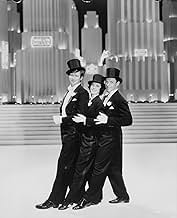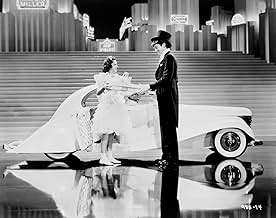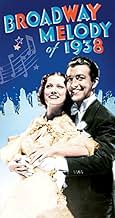Füge eine Handlung in deiner Sprache hinzuSteve Raleigh wants to produce a show on Broadway. He finds a backer, Herman Whipple and a leading lady, Sally Lee, however his wife Caroline Whipple forces Steve to use a known star, not a ... Alles lesenSteve Raleigh wants to produce a show on Broadway. He finds a backer, Herman Whipple and a leading lady, Sally Lee, however his wife Caroline Whipple forces Steve to use a known star, not a newcomer. Sally purchases a horse she used to train when her parents had a farm before the... Alles lesenSteve Raleigh wants to produce a show on Broadway. He finds a backer, Herman Whipple and a leading lady, Sally Lee, however his wife Caroline Whipple forces Steve to use a known star, not a newcomer. Sally purchases a horse she used to train when her parents had a farm before the depression and with two ex-vaudevillians, Sonny Ledford and Peter Trott she trains it to ... Alles lesen
- Auszeichnungen
- 3 wins total
- Magazine Stand Proprietor
- (Nicht genannt)
- Girl at Hamilton Brown's Casting Office
- (Nicht genannt)
Empfohlene Bewertungen
Eleanor Powell was MGM's great dancing star of the era, George Murphy was one of the screen's most reliable hoofers, and Buddy Ebsen was renowned as a character actor with an eccentric dance style--all three have tremendous star quality and they generate several charming moments. But today the film is chiefly recalled for two supporting players: Sophie Tucker and Judy Garland.
Sophie Tucker had been a great stage star for more than 20 years when this film was made, and MELODY offers one of her rare screen appearances: with her no-nonsense, no-holds-barred style, she leaves little doubt about why she was so celebrated--especially when she launches into her signature song "Some of These Days." Garland, on the other hand, was just really beginning her film career, a slightly chunky teenager with a great big voice--and after putting it through the bullseye with a knockout performance of "Everybody Sing" she nailed the audiences of the day with her famous version of "You Made Me Love You," sung to a photograph of Clark Gable. It was the stuff dreams are made of, and from that moment on her film career was straight up all the way.
The stars knock themselves out to make it fun, and very often it is. But as a whole, it never really seems work in a consistent sort of way. When all is said and done, Broadway MELODY OF 1938 is the sort of show that you watch for certain scenes rather than for the show itself, which is considerably less than the sum of its parts. Recommended for 1930s musical fans, but even they will likely find very thin stuff indeed.
Gary F. Taylor, aka GFT, Amazon Reviewer
It's hard to believe that Judy Garland, a dark brunette starry eyed fifteen year old as a supporting novelty prop, hence the almost non-explained entrance into the "Melody" movie, later became a threat to Eleanor Powell, the female equivalent of Fred Astaire. Despite her lack of purpose, as the daughter of a boarding house proprietress for struggling actors, Judy manages to sing up a storm with her first big hits, "Dear Mr Gable", originally sung to the King himself before its inclusion in the film, "Everybody Sing", so popular that one of her films the following year was renamed after the song, sing a bit of "Yours and Mine" in the opening credits, and a dance in a toilet roll crinoline white dress with Buddy Ebsen.
However, "Broadway Melody of 1938" was Judy Garland's earliest feature film foray at MGM, and not surprisingly for a dynamic triple threat performer of her talents, steals the show.
Horses, gambling bets, sneezing experts, owners of a frighteningly large number of dogs and simply a hell of a lot of people with budding talent all contribute to the movie's conflicting story and the famous show business line, "The show must go on" in order for Robert Taylor's Broadway producer character to finance his latest hit production, called ironically enough, "Broadway Melody".
As a dancing spectacular showcase for the brilliant talents of Eleanor Powell, the routines featured are no disappointment, notably "Follow in my footsteps", in the company of the champion racehorse on a traveling train, and the sensational George Murphy/Powell dance "I'm Feeling Like a Million". Finally, the charismatic cast is rounded up by Sophie Tucker, as Judy's mother, singing a great rendition of her special song "Some of these days".
In all, like all the movies in the "Melody" series, this isn't exactly "Singin' in the Rain", but it certainly did a lot for the audiences of the Depression era, hungry for the lavish, fun musicals, and is certainly quite a surprising pleasant musical piece for your own enjoyment.
Rating: 8/10
Wusstest du schon
- WissenswertesThe song "Dear Mr. Gable" was a birthday present for Clark Gable's 36th birthday. Composer and arranger Roger Edens adapted the old song "You Made Me Love You" by James V. Monaco. It was sung at Gable's studio birthday party by a young Judy Garland. Studio head Louis B. Mayer was so impressed by it, that he gave orders to let Garland sing it again in the next great musical MGM was going to produce.
- PatzerIn the number "Follow in My Footsteps" Sally Lee puts her guitar on the bunk, nobody takes it but it can't be seen after the cut.
- Zitate
Alice Clayton: Is he deaf?
Jerry Jason: Well, he was the last time when I asked him for a raise.
- VerbindungenEdited into Grand Central Murder (1942)
- SoundtracksBroadway Melody
(1929) (uncredited)
Music by Nacio Herb Brown
Lyrics by Arthur Freed
Sung by an offscreen chorus during the opening credits
Reprised by the cast in the finale
Top-Auswahl
- How long is Broadway Melody of 1938?Powered by Alexa
Details
- Erscheinungsdatum
- Herkunftsland
- Sprachen
- Auch bekannt als
- Broadway Melodie of 1938
- Drehorte
- Produktionsfirma
- Weitere beteiligte Unternehmen bei IMDbPro anzeigen
Box Office
- Bruttoertrag in den USA und Kanada
- 4.118.020 $
- Weltweiter Bruttoertrag
- 6.204.280 $
- Laufzeit1 Stunde 50 Minuten
- Farbe
- Seitenverhältnis
- 1.37 : 1







































